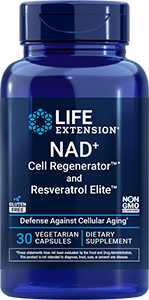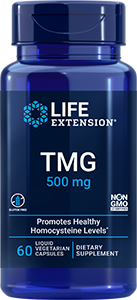
Newsletter
Newsletter
Trial Finds L-Carnitine Improves Sepsis Outcomes, Including Mortality

Sepsis is an immune response to infection that causes inflammation throughout the body and can progress to organ failure and death. A recent randomized, double-blind, placebo-controlled trial in hospitalized patients with sepsis found that participants who received L-carnitine had lower blood markers of inflammation, a reduced risk of 28-day mortality and increased indicators of antioxidant defense.
L-carnitine is a nutrient that is made by the body and is found in some foods, mostly in meat. Stress can lead to insufficient carnitine production, so an extreme stressor like sepsis may increase the body’s requirements.
In the trial, 60 men and women received either 3 grams of L-carnitine per day or placebo for seven days. Blood levels of C-reactive protein (CRP, a marker of inflammation), erythrocyte sedimentation rate (ESR, which is also used in the assessment of inflammation), superoxide dismutase (SOD, an antioxidant made in the body), total antioxidant capacity and other factors were evaluated at the beginning and end of the treatment period.
Compared with levels measured at the beginning of the trial, CRP and ESR were significantly lower, and SOD and total antioxidant capacity were significantly higher after seven days in the group that received L-carnitine. These changes indicate a reduction in the inflammation that characterizes sepsis, as well as greater antioxidant defense. When compared with the placebo, improvements in CRP and SOD were greater among those who received L-carnitine. Fifteen deaths occurred during a 28-day period in the placebo group and seven occurred among the group who received L-carnitine.
“Most notably, the study observed a reduction in mortality after just seven days of treatment,” authors Mahdi Keshani and colleagues wrote. “These encouraging results highlight the potential benefits of L-carnitine supplementation as a therapeutic intervention in managing sepsis and offer promising prospects for enhancing patient outcomes in critical care settings.”
Products
Apply What You’ve Learned: Sepsis
- Sepsis is a body-wide inflammatory response to infection, usually of bacterial origin, though viral, fungal or parasite infections can also cause it. In nearly a third of cases, however, the causative agent is never identified.1 Sepsis is a major cause of mortality in U.S. hospitals and is believed to be responsible for over a quarter million deaths per year.2-3
- Sepsis has three stages: sepsis, severe sepsis and septic shock. In severe sepsis, organ malfunction occurs due to low blood pressure. Septic shock is characterized by very low blood pressure despite the administration of intravenous fluids and has a 30%–40% mortality rate among treated individuals.4
- Sepsis is usually treated in an intensive care unit (ICU). Treatment includes intravenous fluids, antibiotics and drugs that increase blood pressure. Other treatment may be needed if organ failure occurs, such as mechanical ventilation or dialysis.5
- Providing nutritional support in sepsis is challenging and may necessitate the use of a feeding tube (enteral nutrition).
References
- Keshani M et al. Nutr J. 2024 Mar 6;23(1):31.
- Gauer R et al. Am Fam Physician. 2020;101(7):409-418.
- Rhee C et al. JAMA Netw Open. 2019;2(2):e187571.
- Cleveland Clinic. Septic Shock. 2022 Jun 14. https://my.clevelandclinic.org/health/diseases/23255-septic-shock
- Cleveland Clinic. Sepsis. 2023 Jan 19. https://my.clevelandclinic.org/health/diseases/12361-sepsis
Featured Life Extension Magazine® Article
As We See It: Difficult Cancer Treatment Choices
By William Faloon
Women with metastatic breast cancer face treatments that can dramatically impact their quality of life. Mastectomy, chemotherapy, radiation and aromatase inhibitor or selective estrogen receptor modulator drugs may improve cancer survival but have potentially severe side effects.
Many women are unaware that their risk of developing breast cancer can be lowered by lifestyle factors. In addition to knowing one’s personal risk of breast cancer and scheduling regular screening, preventive recommendations include maintaining a healthy weight, engaging in 150-300 minutes per week of moderate-intensity exercise or 75-150 minutes per week of vigorous-intensity exercise, consuming a variety of fruit, vegetables and whole grains, limiting the consumption of red and processed meat, fast food, highly processed food, sugar-sweetened beverages and alcohol, and not smoking.
Read Full Article
What's Hot
Health Concern
Vitamin D Supplementation Could Help Critically Ill Patients
Findings from a review and meta-analysis reported on September 6, 2022, in Critical Care suggest that providing critically ill patients with vitamin D supplements may improve some clinical outcomes, including survival.
Related Life Extension Magazine® Articles

Resolve Persistent Inflammation
Chronic inflammation underlies many diseases of aging. Pro-resolving mediators (PRMs) resolve inflammation, returning tissues to their healthy state.

Fighting Inflammation by Inhibiting NF-KB
Inhibiting a cellular protein complex called nuclear factor kappa B (NF-kB) helps prevent inflammation-driven aging as well as insulin resistance and arthritis. Several nutrients can safely block NF-kB to reduce systemic inflammation.
Highlight
Doctors Michael A. Smith, Crystal Gossard and Stephen Tapanes answer your questions about fatty liver, immune health, cardio exercises, blood pressure and much more on Ask the Doctor!
Learn MoreLife Extension Magazine® Issue Now Online
A remarkable number of healthy-longevity findings have been published over the past 18 months.






